Reply To:
Name - Reply Comment

Lebanese Prime Minister Saad Hariri (L) is welcomed by France’s Foreign Minister Jean-Yves Le Drian as they attend the international CEDRE conference in Paris
AFP: International donors are set to pledge billions of dollars in aid and development loans for Lebanon at a conference in Paris yesterday, hoping to stave off an economic and humanitarian crisis.
Lebanon’s economic growth has plummeted due to repeated political crises, compounded by the Syrian war which has sent a million refugees across the border -- equivalent to a quarter of the Lebanese population before the conflict.
Some 40 countries have sent representatives to the CEDRE conference along with officials from the World Bank and the International Monetary Fund where they are aiming to put together a package worth US$10 billion over four years.
French Foreign Minister Jean-Yves Le Drian kicked off the conference Friday by announcing that France would provide 550 million euros (US$675 million), saying the contribution reflected “the level of our ambitions in Lebanon”. “In a Middle East shaken by crises, wounded by civil wars, Lebanon remains the model of pluralism, tolerance and openness which we need,” he said.
“But Lebanon is not an island. It’s borne the full force of regional tensions and the Syria crisis. It combats terrorism on its borders and in its own country, and with more than a million refugees, it has taken more than its share of the Syrian exodus,” he said.
The office of French President Emmanuel Macron, who will close the conference, said donors were set to approve an investment plan that would notably pour cash into Lebanon’s creaking infrastructure.
Le Drian’s entourage said this week that the investment plan would total an initial US$10.1 billion over four years, rising to US $23 billion over 12 years.
Officials in the office of Prime Minister Saad Hariri, who is attending the conference, said Lebanon was hoping to raise US$6 billion to US$7 billion, with private investors funding the rest of the initial phase.
France held mandate power over Lebanon for the first half of the 20th century and Macron has sought an active role in ensuring its stability, intervening after Hariri’s shock resignation in November 2017, a move he later withdrew.
The Paris conference comes as Lebanon gears up for its first general elections in almost a decade in May, after parliament renewed its own mandate three times since 2009.
Parliament last week adopted a 2018 government budget, projecting a deficit of US$4.8 billion more than double the deficit in 2011, when Syria’s war started.
Economists say the state urgently needs to reduce its spending to avert a crisis.
But public services such as water supplies, electricity and waste management have suffered huge underinvestment.
“The political idea behind (the investment plan) is that the Lebanese state could be able to provide services and infrastructure to the public, rather than others,” an aide to Le Drian said, referring to the powerful Hezbollah Shiite movement.
Macron’s office said Saudi Arabia, widely believed to have pushed Hariri to announce his resignation in November, had sent “positive signals” in terms of whether it will participate in the conference.
Riyadh’s great regional rival Iran, which backs Hezbollah, has in contrast not been invited.
Lebanon will for its part sign up to a string of reforms including tougher measures to fight corruption as well as tighter regulation of the transport and telecoms sectors.
It will also have to find ways of reducing a massive budget deficit equivalent to more than 10 percent of GDP.
“Everyone is well aware that these investments will not work unless they are accompanied by major structural reforms,” Macron’s office said.